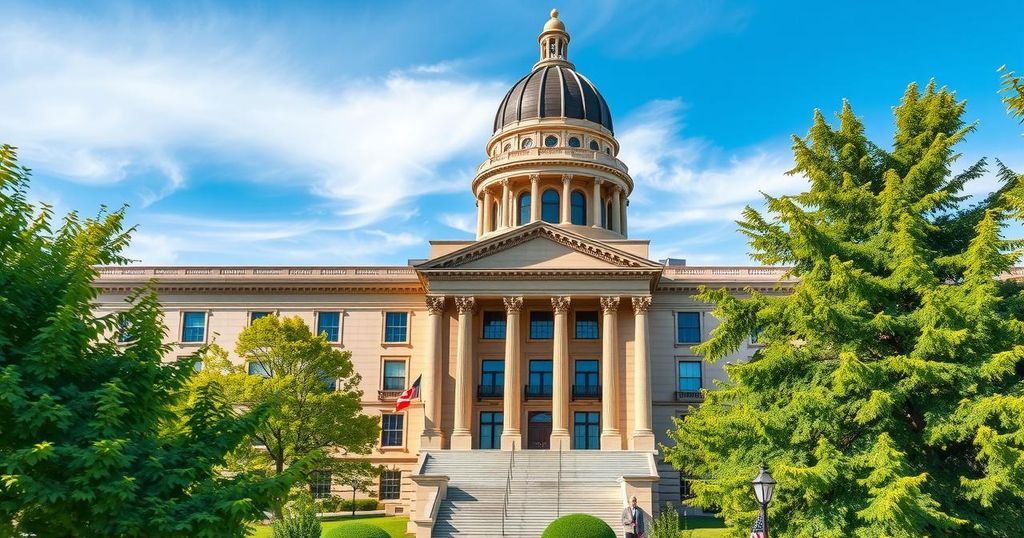Montana Republicans Lead in 2024 Elections but Embrace Unlikely Bipartisanship

Despite a strong showing in the 2024 elections, Montana Republicans faced unexpected alliances during the 2025 Legislature. A faction of GOP lawmakers partnered with Democrats to achieve various legislative goals, challenging traditional partisan dynamics. This coalition adapted well to shifting political landscapes, especially in health care and education funding, while also creating friction within the Republican Party itself.
HELENA, Mont. — In a surprising turn of events during the 2024 election cycle, Montana Republicans, despite their overwhelming victories, experienced a conflict of allegiance in the newly convened 2025 Legislature. A small faction of GOP lawmakers significantly cooperated with Democrats, leading to some unexpected legislative outcomes that defy traditional party lines. This coalition maneuvered to reshape committees and thwart Republican efforts aimed at making the judicial system more partisan.
With their new alliances, moderate Republicans joined forces with Democrats to raise teacher salaries, expand Medicaid, and boost the state budget for affordable housing and healthcare. This strange yet effective collaboration starkly contrasts with the increasingly polarized political climate in the U.S., where party loyalty has often been an unwavering priority for lawmakers. However, many in Montana remain tied to the national narrative, particularly in their support for President Donald Trump.
The dynamic tension within the Montana Legislature, housed in the state Capitol overlooking Helena, offers an intriguing political landscape. Political analyst Jeremy Johnson highlighted the uniqueness of Montana’s current situation, noting, “Montana’s becoming an outlier on how a state legislature is operating with this sort of dynamic.”
As the legislative session neared its end, GOP leaders exhibited frustration over their inability to reign in spending or overhaul the state’s judiciary. Republican Senator Barry Usher articulated that there was a prevailing feeling that the majority had been “steamrolled” during this 85-day session. While they did manage to enact some conservative policies, including tighter regulations on transgender individuals and tax cuts criticized as benefiting the wealthy, these victories were overshadowed by their struggles against moderates aligning with Democrats on major issues.
Senate President Matt Regier characterized the atypical proceedings as “weird,” expressing concern that conservative perspectives were often sidelined during discussions. He remarked, “At the end of the day, what’s weird about it is that I think the conservative faction has been largely left out of conversations.”
In a bold display of defiance, the dissenting GOP senators were censured by party leadership for collaborating with Democrats. Despite threats of being stripped of their party recognition and financial support for their campaigns, these legislators appeared unfazed, continuing to prioritize what they regarded as fairness in their votes. Senator Josh Kassmier insisted, “Really all we did is make sure everybody was treated fairly.”
This division mirrors a broader trend observed across other states with partisan divides. For instance, in Wyoming, the ultra-conservative Freedom Caucus now commands a majority but finds itself squabbling with mainstream Republicans, showcasing similarities to the tensions seen in Montana. Meanwhile, Republican Governor Greg Gianforte appeared to offer a supportive stance toward moderates, reflecting on the importance of representing constituents regardless of party divisions.
Montana, historically known for its tradition of cooperation and ticket-splitting, managed to achieve bipartisan support for Indigenous People’s Day; a goal long pursued but unsuccessfully until this session. Political observers, however, remain skeptical regarding the longevity of such bipartisanship moving forward without a Democratic governor.
Johnson summarized the mixed political climate aptly, stating, “Every legislative session I’ve asked myself, ‘Are we going to see this bipartisan effort, particularly without having a Democratic governor anymore?’ And, so far, the answer is yes. I don’t know how much longer it will keep happening that way.”
Montana’s 2024 elections showcased a surprising shift as some Republicans cooperated with Democrats, leading to significant legislative achievements. Yet, challenges within the GOP have raised questions about the sustainability of this bipartisanship amidst ongoing party tensions and evolving national political trends. Looking ahead, the future dynamics within the Montana Legislature remain uncertain, particularly in light of recent partisan shifts and the ongoing influence of individual lawmakers.
Original Source: apnews.com








